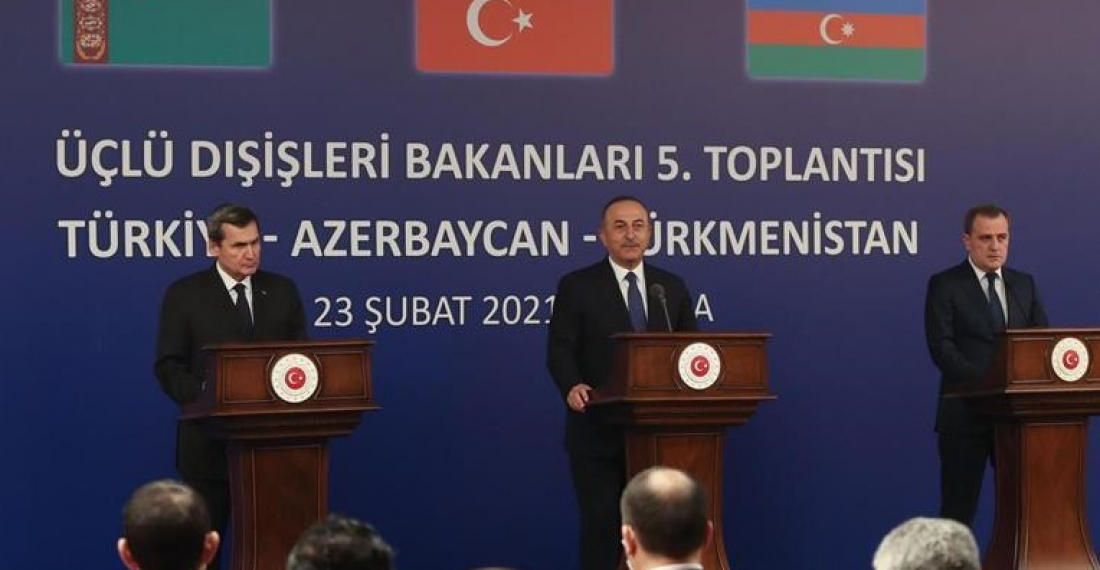Turkey, Azerbaijan and Turkmenistan have held a trilateral meeting at foreign minister level. The meeting, held in Ankara on Tuesday (23 February) was hailed by the three ministers as a significant contribution to the prosperity and stability of the Caucasus-Caspian region.
"Our relationships built on special bonds have turned into a comprehensive partnership today. This trilateral mechanism, which we initiated in 2014, has made a significant contribution to the prosperity and stability of the region," Turkish foreign minister Mevlut Cavusoglu said at a joint press conference with his Azerbaijani and Turkmen counterparts.
Cavusoglu stressed that Turkey wants to work closely with Azerbaijan and Turkmenistan as part of its Asia Anew initiative. Turkey launched the initiative in 2019 to improve ties with Asian countries in various areas.
The ministers also discussed and determined a roadmap for an upcoming trilateral summit of the presidents of the three countries to be held in Turkmenistan, he added.
During the press conference, Çavuşoğlu also spoke about the "brutal competition" across the world for COVID-19 vaccines. "We will continue our solidarity as three sister countries, while continuing our common struggle," he said.
"Our relations have turned into a comprehensive partnership today," Çavuşoğlu said on Twitter, adding that cooperation between the three countries would "continue to increase in every field including transportation and energy."
During the meeting, the ministers signed a joint declaration that emphasized the importance of the trilateral mechanism to enhance multilateral cooperation opportunities.
They agreed to strengthen commercial and economic cooperation, as well as to use their existing potential to encourage investment and trade, and to carry out joint projects and programs including energy, transportation, agriculture, tourism and the environment.
On his part, Azerbaijani foreign minister Ceyhun Bayramov said joint exploration and development of hydrocarbons in the Dostlug (Friendship) field in the Caspian Sea between Azerbaijan and Turkmenistan would provide a positive contribution to the energy security of Turkey and other European countries.
The agreement on the joint exploration of the once-disputed section of the undersea hydrocarbon field was signed in the Turkmen capital Ashgabat on Jan. 21.
It is estimated that the field located in the middle of areas belonging to Azerbaijan and Turkmenistan hosts reserves of 100 billion cubic meters (over 3.5 trillion cubic feet) of natural gas and 60 million tons of oil.
Rashid Meredov of Turkmenistan hailed the trilateral gathering as a "historic meeting," noting that Turkey and Azerbaijan have always supported Turkmenistan's initiatives in the international arena.
"Our Turkish and Azerbaijani brothers always support the initiatives put forward by the President of Turkmenistan [Gurbanguly Berdimuhamedov]. We are hopeful that it will continue so in the future," he said.
He emphasized that the three "brotherly" countries share a common culture, history, language, and civilization, adding that the officials discussed ways to deepen cooperation in these areas.
Experts will also work on furthering cooperation between Turkmenistan, Turkey and Azerbaijan in energy, transportation, technology, trade and other fields, Meredov added.
He also underlined that they discussed important issues, including political and diplomatic matters, during the tripartite meeting. Meredov said that they already started preparations for Turkish President Recep Tayyip Erdoğan's visit to Turkmenistan this year.






